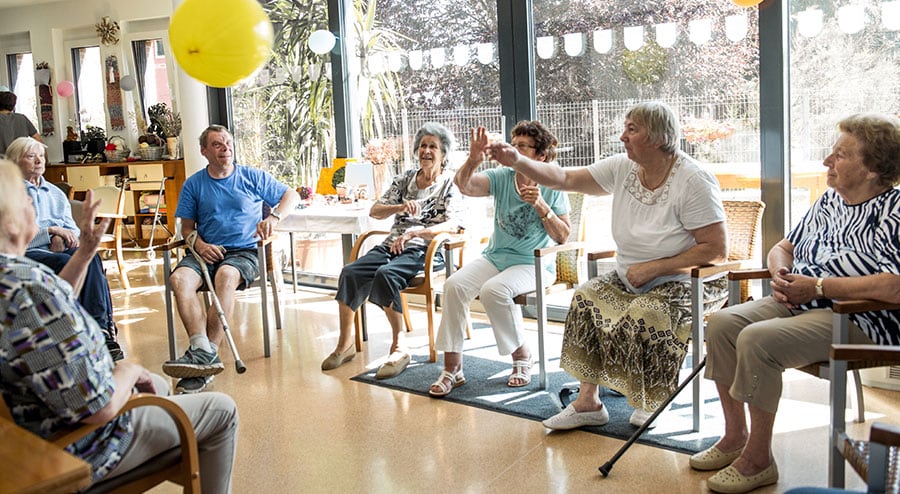Learn about new Memory Care techniques for cognitive well-being.
Learn about new Memory Care techniques for cognitive well-being.
Blog Article
How Assisted Living Facilities Enhance High Quality of Life for Those With Mental deterioration
Aided living facilities play a pivotal role in enhancing the quality of life for people with dementia by applying customized care approaches that cater to their distinct needs. These environments combine organized tasks with psychological assistance, promoting a feeling of community while making certain safety and security and self-reliance. The combination of interesting programs and family participation further enhances the homeowners' experience. The intricacies of dementia care continue to develop, motivating a more detailed examination of how these facilities adjust and introduce to satisfy the obstacles encountered by residents and their families. What ramifications does this have for future care designs?
Personalized Care Plans
(Dementia Care Charlotte)In numerous situations, people with mental deterioration call for customized assistance that resolves their special demands and preferences. Individualized care strategies are necessary in assisted living settings, as they guarantee that each resident receives proper focus and solutions. These plans are developed collaboratively, including health care specialists, caregivers, and household participants to produce a detailed overview of the individual's case history, cognitive capabilities, and individual rate of interests.
A well-structured individualized treatment plan usually includes specific goals associated with wellness monitoring, everyday activities, and social engagement. It accounts for the person's cognitive decrease while promoting independence and self-respect. Normal evaluations and updates to the care strategy are crucial, as they enable adjustments based on the homeowner's progressing condition and choices.
Key components of these strategies usually include medication management, behavior assistance techniques, and nutritional standards tailored to the person's requirements (Assisted Living). By concentrating on customized care, helped living facilities can cultivate a helpful environment that boosts the lifestyle for people with mental deterioration, ultimately adding to their overall health and happiness. This customized technique respects the originality of each citizen, guaranteeing they obtain the caring treatment they need

Involving Tasks and Programs
Engaging homeowners in significant tasks and programs is essential for boosting the quality of life for people with dementia. These tasks not just provide pleasure yet also promote cognitive feature and promote social communication, which can minimize feelings of isolation usually experienced by locals.

Furthermore, individualized programs are essential in making certain that each resident's unique choices and capacities are recognized. This tailored method motivates involvement, improves self-confidence, and offers a sense of achievement.
Furthermore, routine assessments of locals' interests can assist staff change and adjust tasks to far better match progressing requirements. By prioritizing appealing activities and programs, assisted living centers can dramatically enhance the general experience and emotional health of people dealing with dementia.
Safe and Supportive Setting
Creating a secure and helpful environment is essential for people with dementia, as it directly influences their wellness and quality of life. Aided living facilities are designed with details functions that promote safety and security while promoting a complacency and comfort. These environments focus on ease of access, with formats that lessen confusion and urge independence, permitting citizens to navigate their environments more conveniently.
Security measures, such as secure entryways and exits, stop wandering and unapproved access, which are important factors to consider for individuals with dementia (Memory Care). Team member are educated to acknowledge the one-of-a-kind needs of homeowners, offering customized assistance and supervision to guarantee their safety. The consolidation of soothing colors and acquainted objects can assist lower anxiety and disorientation, producing an extra reassuring ambience.
Along with physical safety, psychological assistance is critical. Facilities usually employ personnel that are not just skilled in caregiving however additionally educated in empathy and interaction, cultivating trust and relationship with residents. This alternative technique adds to a nurturing atmosphere where people really feel valued and recognized, inevitably enhancing their overall lifestyle.
Social Communication and Area
A supportive atmosphere not only prioritizes safety and security yet also promotes chances for social interaction and neighborhood interaction, which are important for people with mental deterioration. In assisted living centers, organized tasks and communal areas encourage citizens to get in touch with one another, reducing feelings of seclusion often experienced by those with cognitive impairments.
Social interaction plays a significant role in enhancing psychological health and cognitive feature (Memory Care). Engaging with peers in group tasks such as video games, arts and crafts, or workout not only stimulates cognitive abilities however likewise nurtures a feeling of Discover More Here belonging. Facilities usually arrange occasions that promote socialization, permitting citizens to develop connections and share experiences, which can be particularly beneficial for those with mental deterioration
Additionally, a dynamic area atmosphere can boost the overall top quality of life for residents. Staff participants are educated to help with communications and support citizens in creating purposeful links.
Family Participation and Support
Household participation is essential in sustaining people with dementia in assisted living atmospheres. Proactively involving family participants not just supplies psychological comfort to citizens but likewise cultivates a feeling of belonging and continuity in their lives. When households take part in care planning and everyday tasks, they contribute important understandings concerning the individual's preferences, history, and requires, which can boost personalized care.
Additionally, normal family members gos to can considerably enhance the emotional well-being of citizens, minimizing sensations of seclusion and anxiety. Member of the family can likewise aid in keeping cognitive feature by involving their loved ones in familiar conversations and activities. This interaction reinforces personal identification and aids homeowners really feel valued and recognized.

Conclusion
In conclusion, aided living centers substantially improve the quality of life for people with mental deterioration with personalized treatment strategies, engaging tasks, and a risk-free atmosphere. These elements foster cognitive excitement, emotional well-being, and a feeling of self-reliance. Additionally, normal social communications and strong family members participation add to purposeful links and emotional assistance. Jointly, these factors create a holistic strategy to care that addresses the special needs of people with dementia, advertising overall wellness and dignity.
Report this page